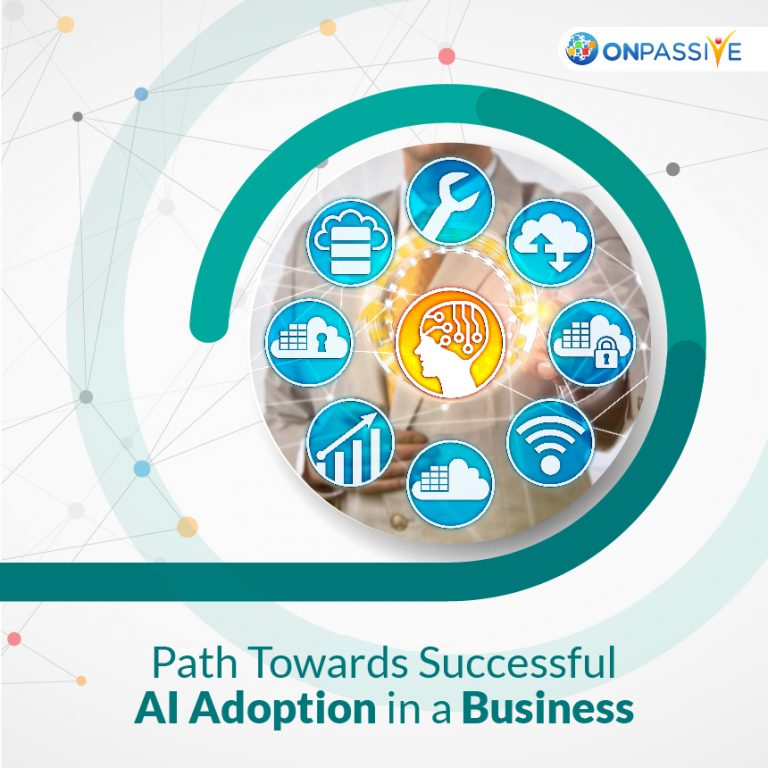
Despite being in the nascent stage, AI has already made a mark in the world of technology. Enterprises across the globe are in a hustle to incorporate this technology into their business process. However, one cannot deny that AI implementation is still limited to the digital giants like Google, Facebook, Microsoft or Amazon.
A report by Statista, an online statistics and market research panel, suggests that advertising, finance, healthcare, consumer, and aerospace are the leading sectors to adopt AI. The gain by early adopters and fear of missing out is prompting enterprises to incorporate AI technology into their business system. Let us understand the key steps towards the successful AI adoption in a business.
Key Steps towards Successful AI Adoption
1. Understand Artificial Intelligence (AI)
Before implementing AI in your business, it is necessary to understand the basic concept of AI and how different it is from ML.
AI and ML are the two-terms that are often used interchangeably. Although the terms are correlated, they have different applications.
Artificial Intelligence is the technology to simulate human thinking capabilities, behavior and problem-solving. It is a bigger concept that makes computer systems mimic human intelligence. Machine Learning (ML), on the other hand, is an application of AI that allows the machines to learn from past data and experiences without being programmed explicitly and make decisions without human participation.
AI Technology helps improve your business in ways like:
- Enhance Employee Productivity
- Boost Marketing Activities
- Save Time and Money
- Achieve Better Results
- Maximize Sales and Revenue.
2. Business Value Evaluation
Prior to successful AI adoption in your business process, it is really necessary to learn the goals you are targeting and how AI can help you achieve them. To understand your business needs, you have to understand a few things completely, such as:
- The goals you want to achieve.
- The main obstacles to achieving these goals?
- The role of AI to carry your business towards success.
- How to measure success?
- The data you have currently, and the additional data you need.
Business value evaluation helps you to examine business problems that require a lot of human interfaces and complex decision-making process. These business problems can be resolved by leveraging Natural Language Processing (NLP) and computer vision to ensure impactful results.
3. Select Pilot Project
A Pilot project is nothing but experimentation and prototypes. It is critical to select well-defined, small-scale pilot projects which are technically feasible. Limiting the scope of the project will allow you to have better execution and control over the results.
Pilot projects are the key to identify and demonstrate the possibilities and increase AI awareness and adoption in an organization. Working closely with the stakeholders of the organization is recommended, as these demonstrations and prototypes will allow them to understand AI and its benefits.
4. Ensure Data Quality
AI algorithms work best on a large quantity of data with high-quality. For better execution of pilot projects, every organization needs to organize frequently, update, and expand its data-set. It is crucial to have accurate, complete and proper labelled data for any AI project’s success. It is necessary to provide ample time in data retrieval and its analysis because this will accelerate the pilot implementation.
5. Start Small
Stay selective while starting with AI technology. Begin with a small sample of your data rather than throwing away all the data you have.
According to Aaron Brauser, Vice President of Solutions Management at Modal ,
“Start simple, use AI incrementally to prove value, collect feedback, and then expand accordingly”.
Starting with small and focused projects will reduce the potential risk and, more significant the impact. Initial success with smaller projects boosts confidence and pave the way for more ambitious initiatives in future. It requires in-depth knowledge and commitment to integrate AI technology into any organization. Currently, it is the technology to take your business to the next level.
However, successful AI execution depends upon the quality and quantity of data. Leveraging this data on a small scale is the key for better outcomes in pilot projects and successful AI adoption. And organizations are aware that without satisfying these values, AI falters.


